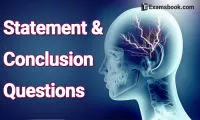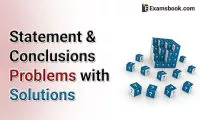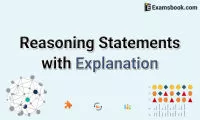 Statement and Conclusion Reasoning Questions with Answers for SSC and Bank Exams
Statement and Conclusion Reasoning Questions with Answers for SSC and Bank Exams - Free Test Series, Mock tests and Practice Tests
- Time proven exam strategies
- Exam analysis and simulated tests
- Hand-on real time test experience

Recently Added Articles View More >>
Reasoning statements questions are very important in the logical reasoning section. Some students don't understand these statements questions in the competitive exams. So here in this blogs, I am sharing selective reasoning statement with explanation for your better preparation.
Statement and conclusion is an important topic in the competitive exams but some of the students have confusion to solve these questions. So here I am sharing statement and conclusion problems with solutions for your practice of competitive exams.
Statement and Conclusion questions are very important for competitive exams. You should practice of Statement and Conclusion questions and answers if you doing preparation for SSC.
Most Popular Articles
Most Popular Articles
Recently Added Questions
Direction: In the given question, assuming the given statements to be true, find which of the conclusions I and II given below the statements is/are definitely true.
Statements:
H > G < C, E ≥ K < D ≤ B, E = C
Conclusions:
I.G ≤ D
II. G>D
3.0K 0 64f73b196e0e55b91d97a6d8- 1If only conclusion I followsfalse
- 2If only conclusion II followsfalse
- 3If either conclusion I or conclusion II followstrue
- 4If neither conclusion I nor conclusion II followsfalse
- 5If both conclusions followfalse
- Show AnswerHide Answer
- Workspace
- SingleChoice
Answer : 3 If either conclusion I or conclusion II follows
Direction: In the following questions, assuming the given statements to be true, find which of the two conclusions I and II given them is/are definitely follow.
Statement: P ≤ Q < S = T ≥ U ≥ W < Z
Conclusion:
I. S > W
II. W = T
2.2K 0 64f73a191778d5be471b775e- 1Only conclusion II is truefalse
- 2Either conclusion I or II is truetrue
- 3Both conclusion I and II are truefalse
- 4Neither conclusion I nor II is truefalse
- 5Only conclusion I is truefalse
- Show AnswerHide Answer
- Workspace
- SingleChoice
Answer : 2 Either conclusion I or II is true
- 1Only I followsfalse
- 2Either I or III followstrue
- 3Only II followsfalse
- 4Both I and II followfalse
- 5None followsfalse
- Show AnswerHide Answer
- Workspace
- SingleChoice
Answer : 2 Either I or III follows
- 1Only conclusion I followsfalse
- 2Either conclusion I or II followsfalse
- 3Only conclusion II followsfalse
- 4Both conclusions I and II followfalse
- 5Neither conclusion I nor II followtrue
- Show AnswerHide Answer
- Workspace
- SingleChoice
Answer : 5 Neither conclusion I nor II follow
- 1Only conclusion I is truefalse
- 2Only conclusion II is truetrue
- 3Both conclusions I and II are truefalse
- 4Either conclusion I or II is truefalse
- 5Neither of the conclusions is truefalse
- Show AnswerHide Answer
- Workspace
- SingleChoice




